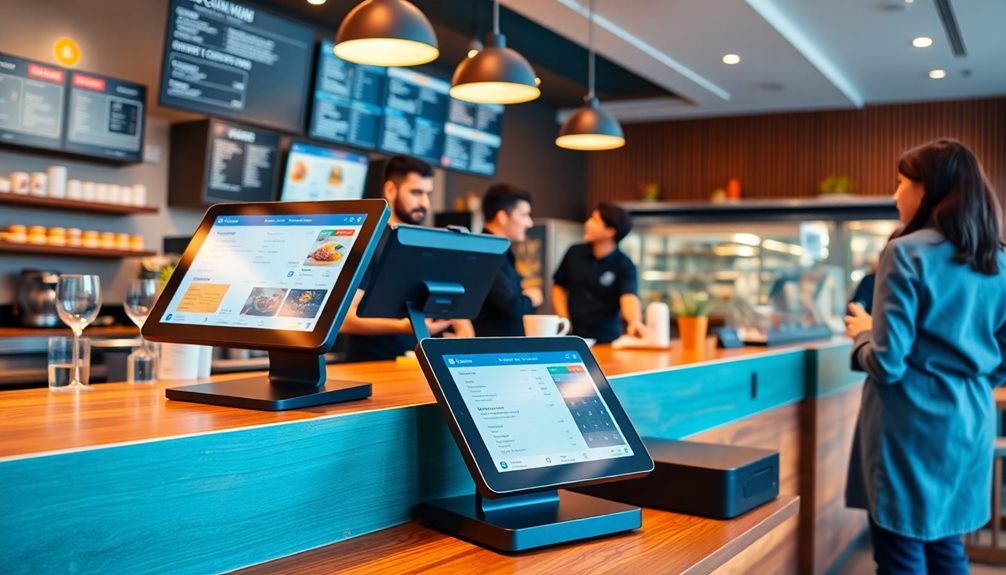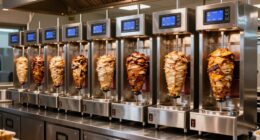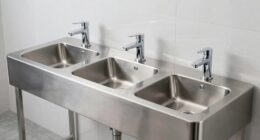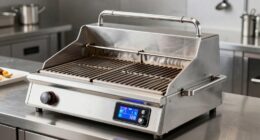Restaurant expediting is an essential link between the kitchen and the dining area, ensuring orders are accurate and delivered on time. It helps reduce wait times, especially during busy hours, enhancing your overall dining experience. Expeditors manage the flow of food, verify dish quality, and communicate effectively with chefs and servers. This role minimizes mix-ups and keeps the kitchen organized, allowing chefs to focus on preparing excellent meals. Understanding how this process impacts customer satisfaction can elevate your restaurant experience, and you might discover more insights on this significant role.
Key Takeaways
- Restaurant expediting involves coordinating orders between the kitchen and dining area to ensure accurate and timely meal delivery.
- Expeditors enhance customer satisfaction by reducing wait times and preventing order mix-ups during service.
- This role streamlines communication between chefs and servers, facilitating better workflow and maintaining food quality standards.
- Effective expediting minimizes kitchen congestion, allowing chefs to focus on food preparation while improving overall service efficiency.
- Successful expediting contributes to increased table turnover rates and restaurant revenue by creating positive dining experiences.
Understanding Restaurant Expediting

Have you ever wondered how a restaurant manages to serve your meal promptly, even during the busiest hours? The secret often lies in the role of the expeditor. This essential position coordinates and manages the flow of orders between the kitchen staff and the dining area, ensuring everything runs smoothly.
When you place your order, the expeditor acts as a liaison, verifying that your meal is prepared accurately and presented beautifully.
During peak service times, an expediter's efficiency can greatly reduce wait times. They communicate with both the kitchen staff and servers, preventing mix-ups and ensuring that dishes are delivered promptly.
This coordination not only enhances the overall efficiency of the restaurant but also impacts customer satisfaction. When your meal arrives on time and meets high-quality standards, you're more likely to leave a positive review and return for another visit.
Training is essential for expediters, as they need to be familiar with kitchen operations and the menu, along with possessing strong communication skills.
This preparation allows them to adapt quickly to the dynamic environment of a restaurant, making them integral to a seamless dining experience. Whether it’s handling unexpected challenges or delivering personalized service, their attentiveness ensures that every guest feels valued. Their ability to anticipate needs and maintain a high standard of professionalism is what defines fine dining. Ultimately, their dedication plays a crucial role in creating an atmosphere of luxury and comfort, elevating the entire dining experience.
Role and Responsibilities of an Expeditor
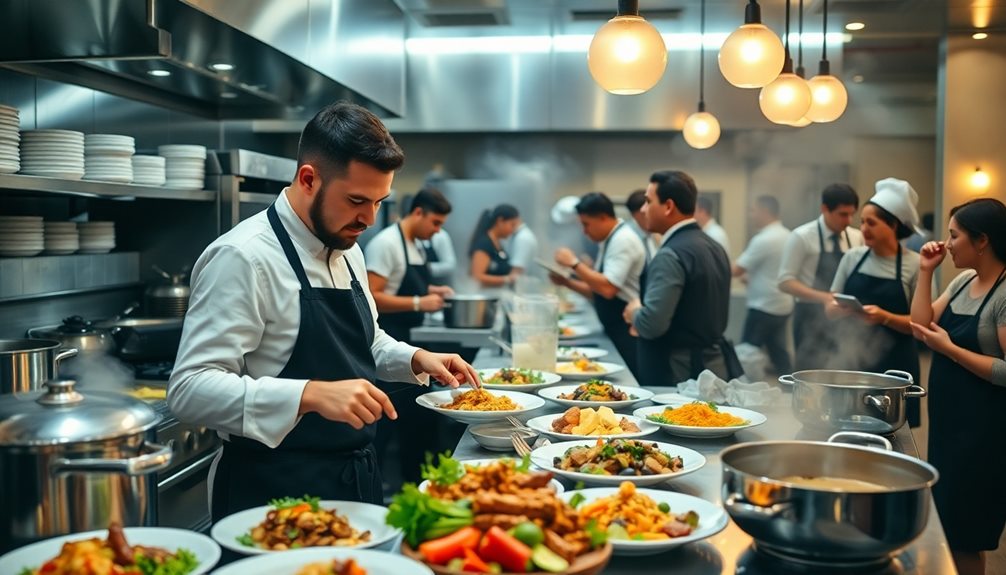
As an expeditor, you're the essential link between the kitchen and the front-of-house team, ensuring smooth communication.
You manage order accuracy, confirming each dish meets quality standards before it reaches the customer.
This role not only keeps the service efficient but also elevates the overall dining experience.
Communication Between Teams
In the heart of a bustling restaurant, the expeditor serves as the critical link between the kitchen and the waitstaff. You play an important role in ensuring that communication flows smoothly, helping to deliver orders accurately and on time.
During busy service periods, you monitor the progress of food orders, relaying essential information between chefs and servers to avoid mix-ups and miscommunication. Your responsibilities also include directing the kitchen staff on order priorities.
You make sure appetizers are served within 15 minutes and main courses within 45 minutes, maintaining a seamless flow of service. This requires effective communication skills, as you need to convey information quickly and clearly, especially when managing high-volume orders.
Additionally, you facilitate communication regarding customer inquiries and complaints, ensuring that any issues are addressed promptly. By acting as the bridge between teams, you not only enhance service efficiency but also contribute to customer satisfaction.
The role of an expeditor is critical in creating a positive dining experience, making your communication efforts essential to the restaurant's success.
Order Accuracy Management
An expeditor plays an essential role in ensuring order accuracy in a restaurant. By verifying each dish against the ticket before it leaves the kitchen, you greatly reduce the chances of errors that could lead to customer dissatisfaction. You communicate directly with both chefs and waitstaff to relay any modifications or special requests, ensuring that the final presentation aligns with customer expectations.
Here's a quick look at your key responsibilities:
| Responsibility | Importance |
|---|---|
| Verify each dish | Reduces order inaccuracies |
| Communicate modifications | Meets customer expectations |
| Manage dish timing | Maintains service flow |
| Oversee plating | Enhances dining experience |
Skills Required for Expeditors

Expeditors play an essential role in the restaurant's operation, requiring a unique blend of skills to guarantee smooth service. Strong communication skills are critical for you to effectively coordinate between the kitchen staff and waitstaff. This ascertains that orders are accurate and delivered promptly, minimizing confusion during busy times.
Your organizational skills come into play as you track order progress and timing. You need to prioritize tasks efficiently, especially during peak hours when multiple orders are coming in.
Multitasking is fundamental; you must manage several orders simultaneously while keeping a calm demeanor in a fast-paced environment.
In addition to these skills, having problem-solving capabilities is important. You'll face unexpected challenges, like order mix-ups or delays, and you must quickly address these issues to maintain customer satisfaction.
Knowledge of food safety and hygiene practices also enhances your role, guaranteeing compliance with health regulations and high standards of food quality.
Importance of Expediting in Restaurants
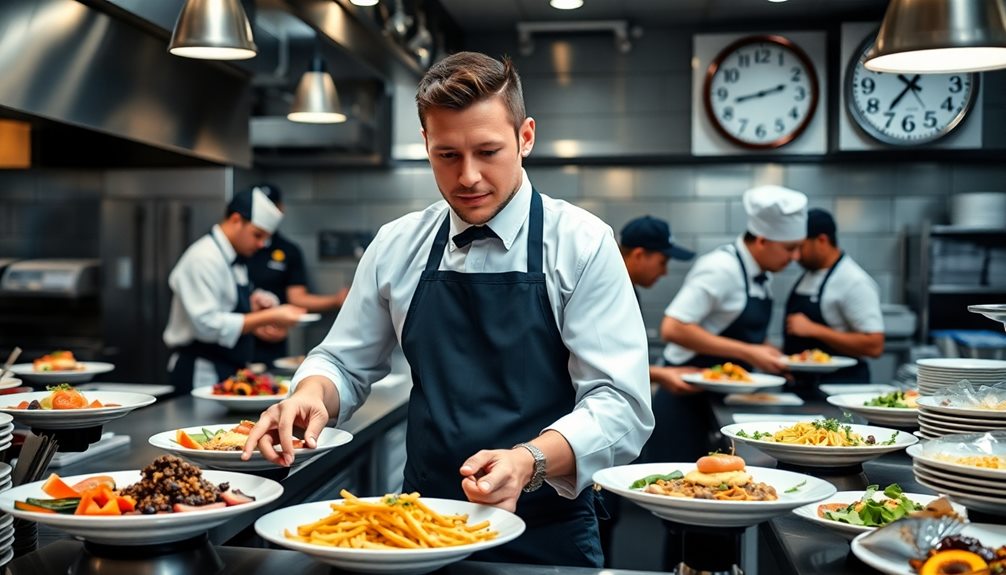
When you think about a restaurant's success, expediting plays a key role in streamlining service efficiency.
It helps enhance communication between the kitchen and waitstaff, ensuring orders are delivered accurately and quickly.
Streamlining Service Efficiency
In the fast-paced environment of a restaurant, effective expediting serves as the essential link between the kitchen and waitstaff, guaranteeing that food orders are delivered accurately and promptly.
The expeditor's role is key in streamlining service efficiency, especially during peak hours when they can manage up to 200 covers. By overseeing the workflow, expeditors greatly reduce wait times and enhance the overall dining experience for your customers.
Additionally, skilled expeditors prevent order mix-ups and maintain quality control, directly impacting customer satisfaction and encouraging repeat business.
With effective expediting, you'll notice higher table turnover rates, which can lead to increased revenue and reduced labor costs for your restaurant.
Training and development for expeditors are important; they need to understand menu knowledge and kitchen operations to adapt to changing service dynamics.
This investment in your team guarantees smooth running, allowing your restaurant to thrive in a competitive market.
Enhancing Team Communication
Effective communication is vital in a restaurant setting, particularly behind the scenes, where miscommunication can easily lead to errors and delays. Restaurant expeditors play an important role as communication bridges between the kitchen and wait staff. They guarantee real-time updates on order statuses, which helps prevent mistakes that could compromise food safety and service quality.
By coordinating dish timing and prioritizing orders, expeditors enhance team collaboration, allowing cooks and servers to work in sync, especially during peak hours. This synchronization greatly reduces the chances of order mix-ups, boosting customer satisfaction by up to 30% in bustling dining environments.
With an expeditor monitoring ticket statuses and communicating directly with both sides, the service flow becomes smoother. This increased efficiency not only reduces wait times for customers but also alleviates stress among the staff.
Strong communication fostered by expeditors improves staff relations and morale. Clear directives and support create a more organized work atmosphere, allowing everyone to focus on delivering an exceptional dining experience.
In the fast-paced world of restaurants, effective communication is key to guaranteeing a seamless operation.
Workflow Management in the Kitchen

A kitchen's workflow management is essential for delivering a seamless dining experience. By coordinating the timing and flow of food preparation, you can guarantee that dishes are completed and served efficiently. Expeditors must play a critical role in this process, acting like air traffic controllers who signal cooks when to finish and fire dishes. This management helps reduce wait times, ensuring appetizers arrive within 15 minutes and main courses within 45 minutes.
A well-organized kitchen workflow can handle up to 200 covers during peak hours, delivering each order accurately and on time. To achieve this, implementing systematic approaches like firing orders in blocks and using dual-rail ticket systems streamlines operations. These strategies minimize congestion and errors, allowing your team to respond quickly during busy shifts.
Ultimately, effective workflow management in your kitchen is key to enhancing customer satisfaction. By guaranteeing that every dish flows smoothly from prep to plate, you not only improve service speed but also elevate the overall dining experience.
When expeditors and kitchen staff work in harmony, the result is a well-oiled machine that keeps customers happy and coming back for more.
Challenges Faced by Expeditors

Expeditors face numerous challenges that can hinder the smooth operation of a bustling kitchen. To effectively address these challenges, you must understand the common hurdles that arise:
- High-Pressure Environment: Missing a shift can cause chaos, disrupting kitchen harmony and the quality of service.
- Inexperience: New expeditors may struggle with complex menus, leading to service errors and delays.
- Balancing Speed and Quality: It's essential to deliver food promptly while ensuring it meets presentation and safety standards.
- Communication Gaps: When servers forget to inform you about table readiness, it complicates food timing and can lead to customer complaints.
As an expeditor, you need to stay calm under pressure while managing multiple orders.
You'll have to maintain a clear overview of the kitchen flow, even when unexpected situations arise, like ingredient shortages or order changes.
These challenges can be intimidating, but mastering them is imperative for a seamless dining experience.
Impact on Customer Experience

The impact of restaurant expediting on customer experience is profound, often determining whether diners leave satisfied or disappointed. When an expediter efficiently manages food handling and guarantees that orders for accuracy are checked, you can expect your meals to arrive promptly and as requested. This attention to detail not only enhances the quality of service but also meets your expectations for a timely dining experience.
Imagine sitting in the dining room, enthusiastically anticipating your order. A skilled expediter reduces wait times and minimizes the chances of mix-ups, allowing you to enjoy your meal without unnecessary delays. During peak hours, their presence creates an organized and calm atmosphere, making your dining experience more enjoyable.
Moreover, a seamless expediting process contributes to higher table turnover rates, which can improve a restaurant's profitability. When diners feel satisfied with their meals and the service, they're more likely to return.
Ultimately, the role of an expediter greatly shapes your experience, guaranteeing that each visit is marked by efficiency, accuracy, and satisfaction.
Career Path for Expeditors

If you're looking to advance your career as an expeditor, starting in entry-level food service roles like serving or cooking can give you valuable experience.
As you gain skills, you may find opportunities to move into higher positions, such as kitchen manager or even specialized roles in catering.
Continuing your education in food safety and operational efficiency can also boost your career prospects considerably.
Advancement Opportunities Available
Steering through the fast-paced restaurant environment opens up various advancement opportunities for those in the expediting role.
As you hone your skills, you'll find numerous paths leading to exciting careers in restaurant operations and beyond. Here are some potential avenues for growth:
- Kitchen Manager: Shift to overseeing kitchen operations, managing staff, and ensuring food quality.
- Front-of-House Manager: Step into a leadership role, managing the dining experience and front-of-house staff.
- Catering Specialist: Leverage your experience to coordinate large-scale catering events, focusing on logistics and customer satisfaction.
- Event Planner: Use your organizational skills to plan and execute food service for various events, expanding your expertise in hospitality.
Networking with industry professionals and pursuing continuous education, like culinary certifications or hospitality management degrees, can further enhance your qualifications.
Successful expeditors often acquire valuable skills that increase their marketability, providing a solid foundation for upward mobility.
Embrace these advancement opportunities, and you'll find yourself charting a rewarding career path in the dynamic world of food service.
Necessary Experience and Skills
Advancing in your restaurant career as an expeditor requires a solid foundation of experience and skills. Gaining hands-on experience in food service roles like server or cook is essential. This background helps you understand kitchen operations and menu items, which is key for effective expediting.
Building strong relationships with kitchen staff and management enhances teamwork and communication—crucial elements in your role. Additionally, completing training or certifications in food handling and safety guarantees compliance with health regulations, boosting operational efficiency.
Here's a quick overview of the necessary skills:
| Skill/Experience | Importance | Development Method |
|---|---|---|
| Experience in food roles | Understands kitchen operations | Work as a server or cook |
| Relationship building | Enhances teamwork and communication | Foster rapport with staff |
| Observational skills | Manages multiple orders under pressure | Practice during busy service times |
Training and Qualifications Needed

A solid foundation in food service is vital for anyone aspiring to be a restaurant expeditor. Whether you're just starting or looking to advance your career, it's essential to have the right training and qualifications. Here are four key areas to focus on:
- Prior Experience: Working as a server or a cook helps you understand kitchen operations and customer interactions, giving you valuable insights into the workflow.
- Culinary Education: Many establishments prefer candidates with a culinary arts degree, an apprenticeship, or relevant certifications. This background guarantees you grasp food preparation and safety.
- Hospitality Knowledge: Fine dining restaurants often seek expeditors with hospitality degrees or substantial experience. High standards of service are a must in these environments.
- Food Handling Certifications: Local health departments typically require food handling certifications. Being knowledgeable about hygiene and safety regulations is vital for maintaining quality service.
Additionally, continuous training and development can enhance your effectiveness as an expeditor.
It helps you adapt to changing restaurant dynamics and fosters teamwork among staff, guaranteeing a smooth operation during busy shifts.
Enhancing Restaurant Efficiency Through Expediting

With the right training and qualifications, you're poised to make a significant impact on restaurant efficiency as an expeditor. Your role is essential as you act as the communication bridge between the kitchen and waitstaff, ensuring timely order delivery. By managing the flow of orders, you help minimize kitchen congestion, allowing chefs to focus on food quality without interruptions.
Enhancing restaurant efficiency is fundamental for a successful dining experience. Efficient expediting leads to improved table turnover rates, meaning you can serve more customers during peak hours. When orders are fulfilled accurately and promptly, customer satisfaction rises, encouraging repeat business.
Your impact doesn't stop there; effective expediting reduces errors, which is critical in busy environments. Training and development in this role can transform the overall service performance, enabling your team to respond swiftly to the demands of a bustling restaurant.
In this way, you're not just an expeditor—you're a key player in creating positive dining experiences. Embrace your role, and you'll see how enhancing restaurant efficiency can elevate not only the establishment but also your professional growth.
Frequently Asked Questions
What Is Expediting in a Restaurant?
Expediting in a restaurant means coordinating food orders between the kitchen and dining area. You guarantee timely delivery, monitor food quality, and maintain efficient service, ultimately enhancing the customer experience and satisfaction.
Why Is Expediting Important?
Expediting's essential! You're the maestro, orchestrating timely dish delivery, ensuring every plate dazzles, and making customer experiences unforgettable. Without you, chaos reigns, and satisfaction plummets, leaving diners longing for the extraordinary.
What Does a Food Expeditor Do?
A food expeditor guarantees your orders are accurate and beautifully presented. They communicate with cooks and waitstaff, manage the timing of dishes, and handle any customer inquiries, enhancing your overall dining experience.
Is Being a Food Expeditor Hard?
You're stepping into a whirlwind of excitement and challenge. Being a food expeditor can be tough, as you juggle multiple orders, communicate swiftly, and stay organized, all while keeping that calm, cool demeanor under pressure.
Conclusion
In the fast-paced world of restaurants, effective expediting can make or break your operation. By ensuring smooth communication between the kitchen and the dining area, you're not just keeping the wheels turning—you're serving up a high-quality customer experience. So, if you want to keep your restaurant running like a well-oiled machine, investing in skilled expeditors is key. Remember, in this business, every second counts, and great expediting can truly be the cherry on top!

